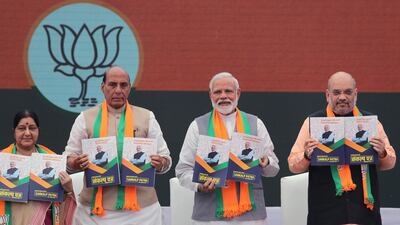Indian Prime Minister Narendra Modi on Monday sought to woo Hindu voters and farmers with an election manifesto he hopes will help him seal a second term in office.
Mr Modi's right-wing Bharatiya Janata Party (BJP) outlined its key policies in the document released with fanfare in New Delhi, balancing nationalist policies with development promises, three days before elections begin.
The party said it was committed to building a grand temple for the Hindu god Ram "as soon as possible in a harmonious way" and pass a citizenship bill that would grant Indian nationality to Hindus from neighbouring countries.
The conflict over whether a temple or a mosque should be constructed in the holy city of Ayodhya is a major flashpoint between Hindus, who make up about 80 per cent of the population, and Muslims, India's largest minority.
Under fire from the opposition Congress party for not doing enough for India's struggling farmers, the party said it would spend more than $300 billion (Dh1.1 trillion) on rural development.
It would also extend an annual handout of 6,000 rupees (Dh320) and introduced a pension scheme for small and marginal farmers.
"Nationalism is our inspiration ... good governance is our mantra," Mr Modi, 68, said at the launch.
"It (the manifesto) is multi-layered and multi-dimensional because our society is very diverse. We can't have a one-size-fits-all kind of policy. It addresses the needs of all sections of society."
The party also said it would scrap a historic law providing special rights to the residents of Jammu and Kashmir, a move that is likely to spike tension in the tinderbox state.
The BJP manifesto comes on the heels of the Congress' election platform released last week which promised to "create wealth and guarantee welfare" to India's 1.3 billion people.
Congress had announced 72,000 rupees ($1,045) each to India's poorest 250 million families.
The BJP also matched the promise made by Congress to reserve 33 per cent of seats in parliament and state assemblies for women, saying "women's welfare and development will be accorded a high priority at all levels within the government".
Recent opinion polls, although notoriously unreliable, suggest Congress is trailing BJP ahead of India's mega-election running from April 11 to May 19.
The BJP, which decimated Congress as it swept to power in 2014, has been riding a nationalistic wave, vowing to protect the country against Pakistan-backed "terrorism".
In February, India and Pakistan faced off in their worst confrontation in years over the disputed region of Kashmir, conducting tit-for-tat air strikes after a deadly bomb attack on Indian troops in the territory.
Political leaders in Muslim-majority Kashmir, where India is fighting an armed insurgency against its rule, have warned that the BJP's long-stated goal of ending Kashmir's special constitutional status would lead to widespread unrest. The BJP argues that such laws have hindered Kashmir's integration with the rest of the country.
"We believe that Article 35A is an obstacle in the development of the state," the BJP manifesto said, referring to the 1954 amendment to the constitution.
"This manifesto has been prepared with strong nationalist vision ... it is rooted in India's realities," said Finance Minister Arun Jaitley.
Addressing criticism that Mr Modi has failed to create employment, the BJP promised a capital investment of 100 trillion Indian rupees on infrastructure by 2024, to help create jobs for the millions of youth entering the workforce every year.
The party also pledged to simplify the goods and services tax, which disrupted businesses and hurt economic growth when it was introduced in 2017.
The BJP said it would also work towards lowering the tax rate and raise credit to small businesses to 1 trillion Indian rupees by 2024.

